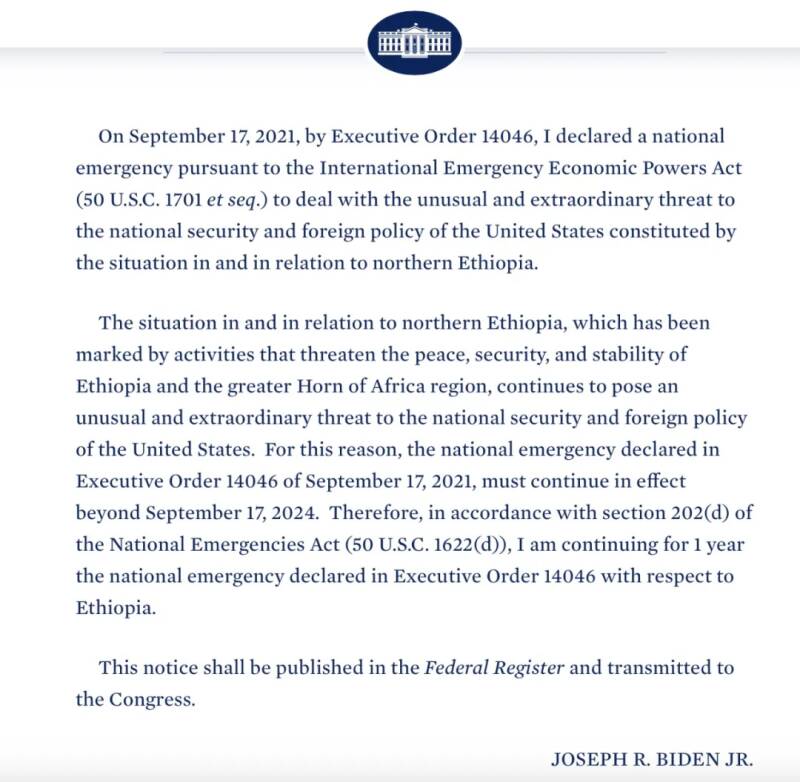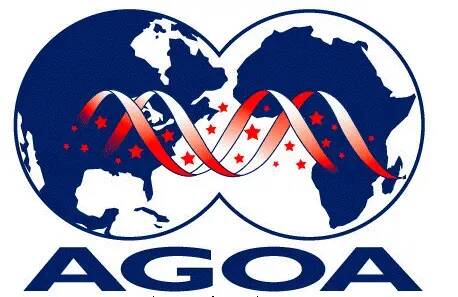The United States declares that Ethiopia will continue to implement a national emergency!
According to media reports, on September 6, the White House issued a statement announcing that Ethiopia continues to implement national tensions. And the continuation of the Ethiopian state of emergency was announced after the news of a currency swap agreement between China and Ethiopia.
However, the Ethiopian Finance Minister revealed the currency swap agreement with China in an interview, but details of the currency swap finance have not yet been disclosed. The final timetable has not been set. It is reported that the national banks of China and Ethiopia have carried out relevant work, and Chinese financial service providers will carry out business in Ethiopia. It is understood that currency swap agreements can enable both countries to strengthen financial cooperation, promote trade and investment facilitation, reduce dependence on US dollars, reduce aggregate costs and exchange rate risks, and promote the development of international trade.
As early as September 17, 2021, the United States declared a state of emergency under the National Emergency Economic Powers Act to deal with the threat of the situation in northern Ethiopia, according to a statement issued by the United States. The situation in northern Ethiopia has long threatened peace, security and stability in Ethiopia and the Horn of Africa, as well as threats to the national security and foreign policy of the United States. As a result, the Ethiopian national state of emergency will continue after 17 September 2024, which will last for one year until 2025.

It is reported that the president of the United States can declare a state of emergency and impose sanctions on other governments, organizations, enterprises, political parties or individuals on the grounds of national security. It also means that the United States may take a series of measures to deal with threats from Ethiopia, including restrictions on trade, investment or technology transfer in specific countries.
It is understood that in order to promote the development of African countries, the US government passed the African growth and opportunity Act (AGOA) in 2015 to make it more convenient and preferential (low tariff or duty-free) for the export of goods from African countries to the United States. But Ethiopia was removed from the AGOA Act by the United States in 2022, so tariffs on Ethiopia's main exports (crops such as coffee, textiles and leather goods, etc.) will be restored, dealing a severe blow to many Ethiopian industries because the United States and the European Union were Ethiopia's major importers at that time.

In August this year, when Ethiopia implemented a new foreign exchange policy and the Ethiopian currency, the Bill, began to fall, the United States began to ease its attitude towards Ethiopia's return to AGOA, claiming that the Ethiopian government needed to solve the problem of civil unrest outside the capital in order to qualify for AGOA. But for now, Ethiopia's chances of getting AGOA are slim.
In addition, the current situation in Ethiopia is not optimistic, as armed conflicts have broken out in many parts of the country, and the conflicts originally in the north of the country have begun to spread to the central capital and areas around the south, in addition, relations with Somaliland have deteriorated and conflicts have broken out at any time.
Ethiopia's foreign exchange earnings are very dependent on exports, especially agricultural exports, mainly coffee and other agricultural products. However, according to data analysis, Germany is currently the largest importer of Ethiopian coffee, followed by Saudi Arabia and Japan, while the United States ranks fourth, accounting for 9.3% of Ethiopia's coffee exports.
At present, the United States has imposed a state of emergency on Ethiopia, which may restrict trade between the two sides, reduce imports of Ethiopian coffee, and reduce exports of fertilizers, industrial supplies and other goods to Ethiopia. This will be a serious blow to Ethiopia's economy, which is likely to be further exacerbated by the rise in local prices and the cost of living as a result of Ethiopia's earlier foreign exchange policy. For the coffee industry, rising costs and reduced exports will lead to a sharp rise in coffee prices.
For more information about coffee producing areas, please scan the code directly and follow: coffee comments.
Long press the QR code to follow:
Important Notice :
前街咖啡 FrontStreet Coffee has moved to new addredd:
FrontStreet Coffee Address: 315,Donghua East Road,GuangZhou
Tel:020 38364473
- Prev

Sued by multiple former employees?! Wahaha: Seriously inaccurate
▲ Click to pay attention| Daily Boutique Coffee Culture Magazine Coffee Workshop yesterday, the entry #Wahaha sued by many former employees #hit a hot search, attracting attention from all walks of life. According to media reports, many former employees and internal employees of Wahaha Group said that since August, they have been asked to terminate their contracts with Wahaha Group.
- Next

What are the characteristics of coffee in São Paulo State, Brazil and what is its name?
South America is the fourth largest continent in land area. The state is rich in natural resources. The west of South America has the Andes Mountains, and the east is mainly plains and plateaus. The average altitude of the entire continent reaches 600 meters. These mountains bring multiple volcanoes and rivers, and most of the state has a rainforest climate and savanna atmosphere.
Related
- What grade does Jamaica Blue Mountain No. 1 coffee belong to and how to drink it better? What is the highest grade of Blue Mountain coffee for coffee aristocrats?
- What are the flavor characteristics of the world-famous coffee Blue Mountain No. 1 Golden Mantelin? What are the characteristics of deep-roasted bitter coffee?
- Can I make coffee a second time in an Italian hand-brewed mocha pot? Why can't coffee be brewed several times like tea leaves?
- Hand-brewed coffee flows with a knife and a tornado. How to brew it? What is the proportion of grinding water and water temperature divided into?
- What is the difference between Indonesian Sumatra Mantinin coffee and gold Mantinin? How to distinguish between real and fake golden Mantelin coffee?
- What does bypass mean in coffee? Why can hand-brewed coffee and water make it better?
- Unexpected! Ruixing Telunsu lattes use a smoothie machine to foam milk?!
- % Arabia's first store in Henan opens into the village?! Netizen: Thought it was P's
- Does an authentic standard mocha coffee recipe use chocolate sauce or powder? Mocha Latte/Dirty Coffee/Salty Mocha Coffee Recipe Share!
- What is the difference between Vietnam egg coffee and Norway egg coffee? Hand-brewed single product coffee filter paper filter cloth filter flat solution!

